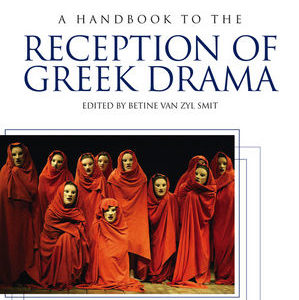If you are looking for resources to support your teaching, or thinking of developing a new syllabus in classical reception, you’ll be interested in the latest publication by CRSN member Betine van Zyl Smit. She had edited the Handbook to the Reception of Greek Drama, which is the latest volume to be published in Wiley Blackwell’s series of handbooks to the reception of the classical world. The 25 contributors, scholars of classical drama and theatre studies including Betine herself on ‘The Reception of Greek Drama in England from the Seventeenth to the Twenty-First Century’, provide an overview of the reception of Greek tragedy and comedy from antiquity to the present.
The Handbook covers the evolution of Greek drama within the ancient world and its translation, transmission and adaptation across the centuries throughout the world. It tells the remarkable story of how the plays first created and performed in ancient Athens were studied and performed, translated and transformed, first in Europe and then across the world. It is noteworthy that the account of the reception of Greek drama reflects not only a history of how the plays were adapted and performed over the centuries, but also the wider history of the theatre. Important cross-cultural influences emerge: a production of Sophocles’ Antigone in Potsdam in 1841 finds echoes in almost every country in Europe.
The chapters that move beyond Europe – to the Middle East, North America, Japan, Africa and Australia – reveal a similar pattern of initially reverent approaches to the ‘high’ culture of the ancient Greeks followed by assimilation to the new environments and adaptation to issues pressing in modern societies. The final part of the book deals with the development of opera from Greek tragedy, and offers a survey of some of the most important film adaptations of myth and drama.
Betine’s other work includes research on classical drama in South Africa, for example ‘Orestes and the Truth and Reconciliation Commission’, Oxford Journal of Classical Receptions 2(1), 2010, 114-135 and ‘From Penelope to Winnie Mandela: women who waited’, International Journal of the Classical Tradition 15(3), 2008, 393-406.

